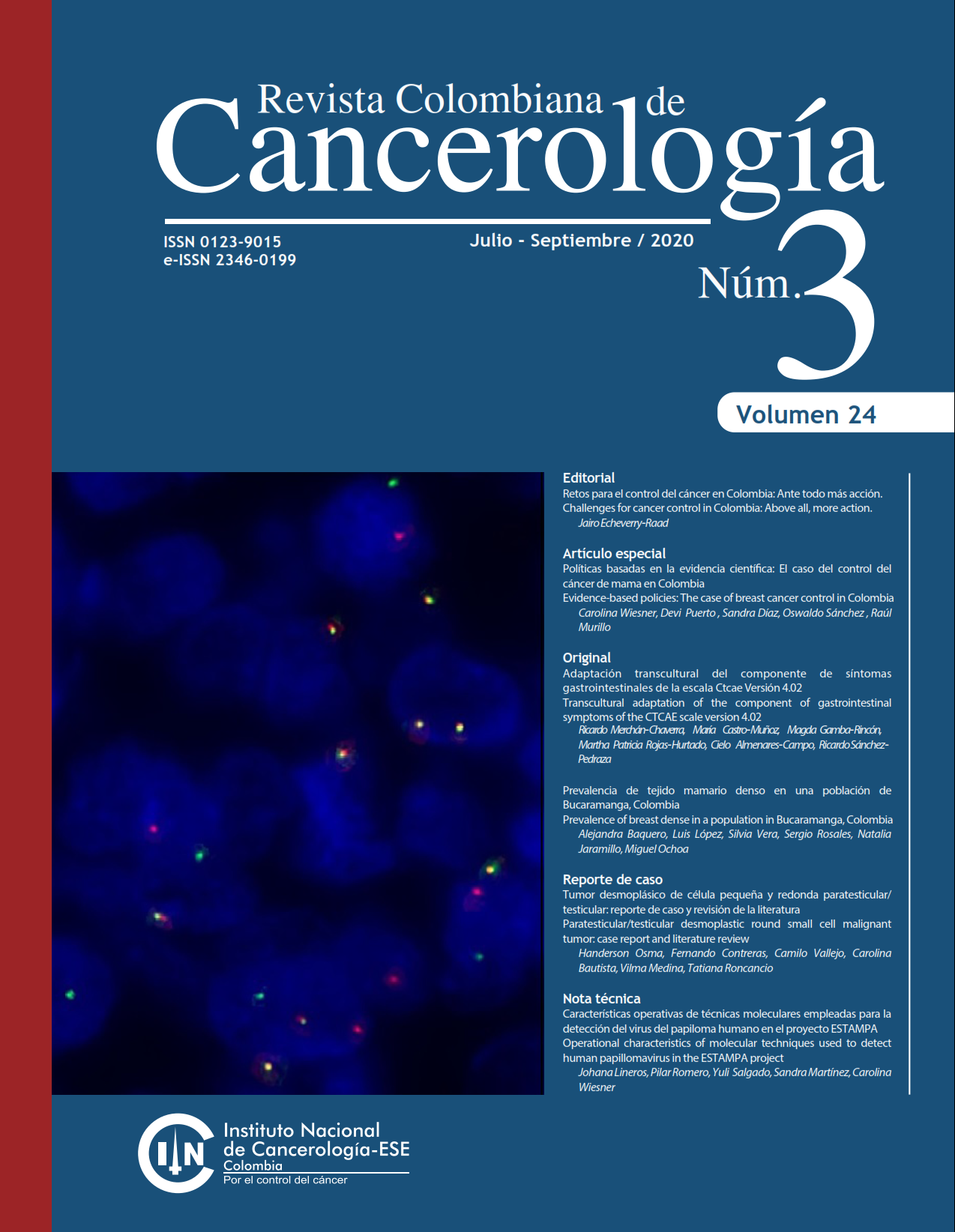Transcultural adaptation of the component of gastrointestinal symptoms of the CTCAE scale version 4.02
DOI:
https://doi.org/10.35509/01239015.51Keywords:
Drug Therapy, Neoplasms, Symptom Assessment, Signs and Symptoms Digestive, Ambulatory CareAbstract
Objective: To carry out the translation and transcultural adaptation of the gastrointestinal symptoms component (GIS) of the CTCAE scale version 4.02, in outpatient patients treated with chemotherapy at the National Institute of Cancerology in Bogotá.
Methods: A manual search was performed on electronic media, scales in English or Spanish languages, which will evaluate the presence and intensity of GIS in oncological patients. The selection of the items was made by an informal consensus of a technical committee, which verified the concordance between the main GIS described in the literature and those included in the scale, all of which could affect the nutritional status. For transcultural adaptation, the steps and recommendations of the ISPOR Handbook and the EORTC quality of life group were followed. The pilot test was conducted in 25 patients selected for convenience, who met the inclusion criteria.
Results: 52% were men; the average age was 54.2 years (+/-15.3 years). The most frequent cancers were colorectal (28%), stomach (16%) and breast (12%). The 14 SGI included in the scale were experienced by all patients, so they were retained, and no other addition was required. The average time of application of the instrument was 5 minutes and 90% of the participants considered it appropriate.
Conclusions: A 14-item instrument was generated to measure GIS in cancer patients undergoing outpatient chemotherapy, which is fast-applied and uses language that is easy to understand for the patient. Their clinimetrics properties remain to be defined.
Author Biographies
Ricardo Sánchez Pedraza, Instituto Nacional de Cancerología
Grupo de Investigación Clínica, Instituto Nacional de Cancerología, Bogotá D.C., Colombia. Instituto de Investigaciones Clínicas, Universidad Nacional de Colombia, Bogotá D.C., Colombia.
Ricardo Alfonso Merchán-Chaverra, Universidad Nacional de Colombia
Universidad Nacional de Colombia, Bogotá D.C., Colombia.
María Carolina Castro-Muñoz, Universidad Nacional de Colombia
Universidad Nacional de Colombia, Bogotá D.C., Colombia.
Magda Rocío Gamba-Rincón, Universidad Nacional de Colombia
Universidad Nacional de Colombia, Bogotá D.C., Colombia.
Martha Patricia Rojas-Hurtado, Instituto Nacional de Cancerología
Grupo de Investigación Epidemiológica del Cáncer, Instituto Nacional de Cancerología, Bogotá D.C., Colombia.
Cielo Almenares-Campo, Instituto Nacional de Cancerología
Instituto Nacional de Cancerología. Bogotá D.C., Colombia.
References
DeVita VT, Chu E. A history of cancer chemotherapy. Cancer Res. 2008;68(21):8643–53.
American Cancer Society. Principios de la quimioterapia: Un análisis exhaustivo de las técnicas y su papel en el tratamiento del cáncer. Am Cancer Soc [Internet]. 2013;30. Available from: http://www.cancer.org/acs/groups/cid/documents/webcontent/002996-pdf.pdf
Krause M V, Mahan LK, Escott-Stump S. Nutrición y dietoterapia de Krause [Internet]. McGraw-Hill Interamericana; 2005. Available from: https://books.google.com.mx/books?id=5QOQAQAACAAJ
García-Luna PP, Parejo Campos J, Pereira Cunill JL. Causas e impacto clínico de la desnutrición y caquexia en el paciente oncológico. Am J Med. 2006;21(Supl.3):10–7.
Xue H, Sawyer MB, Wischmeyer PE, Baracos VE. Nutrition modulation of gastrointestinal toxicity related to cancer chemotherapy: from preclinical findings to clinical strategy. JPEN J Parenter Enteral Nutr. 2011 Jan;35(1):74–90.
Lancheros L, Gamba M. Caracterización de la evolución del estado nutricional de pacientes con cáncer de mama en tratamiento quimioterapéutico. Rev Colomb Cancerol. 2004;11–22.
Grosvenor M, Bulcavage L CR. Symptoms potentially influencing weight loss in a cancer population. Correlations with primary site, nutritional status, and chemotherapy administration. Cancer. 1989;63(2):330–4.
Zorlini R, Akemi Abe Cairo a, Salete Costa Gurgel M. Nutritional status of patients with gynecologic and breast cancer. Nutr Hosp. 2008;23(6):577–83.
Boussios S, Pentheroudakis G, Katsanos K, Pavlidis N. Systemic treatment-induced gastrointestinal toxicity: incidence, clinical presentation and management. Ann Gastroenterol [Internet]. 2012;25(2):106–18. Available from: http://www.ncbi.nlm.nih.gov/pubmed/24713845%250Ahttp://www.pubmedcentral.nih.gov/articlerender.fcgi?artid=PMC3959393
Donaldson S, Lenon R. Alterations of nutritional status. Impact of chemotherapy and radiation therapy. Cancer. 1979;2036–52.
Gaviria A, Vinaccia S. Calidad de vida relacionada con la salud, afrontamiento del estrés y emociones negativas en pacientes con cáncer en tratamiento quimioterapéutico. Psicol desde el …. 2007;
Hernandez A. Tratado de Nutrición: Nutrición Humana en el Estado de Salud. 1a ed. Sev. 1a ed. Sevilla: Editorial Acción Médica; 2005., editor. 1a ed. Sevilla: Editorial Acción Médica; 2005.; 2010.
Linz D, Walteros C, Serrano L. Efectos Secundarios del Tratamiento de Cáncer de Próstata Localizado, en Calidad de Vida y Ajuste Marital. urologiacolombiana.com. 2003;2(2):169–86.
Rafaela Festugatto Tartari 1 , Fernanda Michielin Busnello 2 CHAN. Nutritional Profile of Patients Submitted to Chemotherapy in a Tertiary Outpatient Clinic Perfil Nutricional de Pacientes Sometidos a Tratamiento Quimioterápico en Ambulatorio Especializado en Quimioterapia. Rev Bras Cancerol [Internet]. 2010;56(1):43–50. Available from: http://www1.inca.gov.br/rbc/n_56/v01/pdf/07_artigo_perfil_nutricional_paciente_oncologico.pdf
Johnson C, Aaronson N, Blazeby JM, Bottomley A, Fayers P, Koller M, et al. EORTC QUALITY OF LIFE GROUP Guidelines for Developing Questionnaire Modules. 2011 [cited 2017 May 2]; Available from: http://groups.eortc.be/qol/sites/default/files/archives/guidelines_for_developing_questionnaire-_final.pdf
Sánchez R, Ballesteros M, Arnold BJ. Validation of the FACT-G scale for evaluating quality of life in cancer patients in Colombia. Qual Life Res. 2011;20(1):19–29.
Agra Y, Badía X. Evaluación De Las Propiedades Psicométricas De La Versión Española Del Rotterdam Symptom Checkljst Para Medir Calidad De Vida En Personas Con Cáncer (*). I -Enero-Febrero. 1999;73:35–44.
de Haes JC, van Knippenberg FC, Neijt JP. Measuring psychological and physical distress in cancer patients: structure and application of the Rotterdam Symptom Checklist. Br J Cancer. 1990 Dec;62(6):1034–8.
Sánchez R, Echeverry J. Validación de escalas de medición en salud. Rev salud pública. 2004;6(3):302–18.
Velarde-Jurado E, Avila-Figueroa C. Consideraciones metodológicas para evaluar la calidad de vida. Salud Publica Mex. 2002;44(5).
Sánchez R, Ballesteros M, Ortiz N. Análisis de la validez de contenido de la escala FACT-G mediante técnicas de escalamiento multidimensional. Rev Colomb Cancerol. 2010 Jan;14(4):225–33.
Sánchez R, Venegas M, Otero J, Sánchez O. Adaptación transcultural de dos escalas para medir la calidad de vida en pacientes con cáncer en Colombia: EORTC QLQ-C30 y QLQ-BR23; Transcultural. Rev colomb cancerol. 2009 Jan;13(4):205–12.
National Cancer Institute. Common Terminology Criteria for Adverse Events (CTCAE) Common Terminology Criteria for Adverse Events v4.02 (CTCAE) [Internet]. 2009 [cited 2017 Apr 14]. Available from: https://evs.nci.nih.gov/ftp1/CTCAE/Archive/CTCAE_4.02_2009-09-15_QuickReference_8.5x11.pdf
Dias V, Coelho S, Ferreira F. O grau de interferência dos sintomas gastrintestinais no estado nutricional do paciente com câncer em tratamento quimioterápico. Rev Bras Nutr Clin. 2006;
Flores L, Bennett A, Law E. Patient-Reported Outcomes vs. Clinician Symptom Reporting During Chemoradiation for Rectal Cancer. Gastrointest Cancer Res. 2012 Jul;5(4):119–24.
Wild D, Grove A, Eremenco S, McElroy S, Verjee-Lorenz A, Erikson P. Principles of Good Practice for the Translation and Cultural Adaptation Process for Patient-Reported Outcomes (PRO) Measures: Report of the ISPOR Task Force for Translation and Cultural Adaptation. Value Heal. 2005;8(2):94–104.
Kuli D, Bottomley A, Velikova G, Greimel E, Koller M. EORTC Quality of Life Group Translation Procedure 2017. Eur Organ Res Treat Cancer. 2017;(Fourth Edition):1–26.
Instituto Nacional de Cancerología. Guía de práctica clínica para la atención y el soporte nutricional del paciente oncológico adulto hospitalizado. Guía para profesionales de la salud. [Internet]. 2017. 31 p. Available from: https://intranet.cancer.gov.co/Guias_y_Protocolos/GUIAS/Atencion_soporte_nutricional/GUIA_atencion_soporte_nutricional_Pacientes.pdf
Crawford S. Anti-inflammatory/antioxidant use in long-term maintenance cancer therapy: A new therapeutic approach to disease progression and recurrence. Ther Adv Med Oncol. 2014;6(2):52–68.
Castañeda de la Lanza C, O’Shea C. GJ, Narváez Tamayo MA, Lozano Herrera J, Castañeda Peña G, Castañeda de la Lanza JJ. Calidad de vida y control de síntomas en el paciente oncológico. Gac Mex Oncol [Internet]. 2015;14(3):150–6. Available from: http://linkinghub.elsevier.com/retrieve/pii/S1665920115000449
Brown V, Sitzia J, Richardson a, Hughes J, Hannon H, Oakley C. The development of the Chemotherapy Symptom Assessment Scale (C-SAS): a scale for the routine clinical assessment of the symptom experiences of patients receiving cytotoxic chemotherapy. Int J Nurs Stud. 2001 Oct;38(5):497–510.
Institute NC. Common Terminology Criteria for Adverse Events v5.0 (CTCAE) [Internet]. Principles and Practice of Clinical Trial Medicine. 2017. Available from: https://linkinghub.elsevier.com/retrieve/pii/B9780123736956000223
How to Cite
Downloads
Downloads
Published
Issue
Section
License
Copyright (c) 2020 Revista Colombiana de Cancerología

This work is licensed under a Creative Commons Attribution-NonCommercial-NoDerivatives 4.0 International License.
Todos los derechos reservados.





